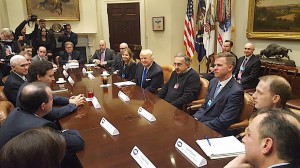
President Donald Trump, center, met with the CEOs of Ford, General Motors and Fiat Chrysler to discuss jobs.
Change can come quickly with a new Presidential administration. At least that’s what Ford, General Motors, Fiat Chrysler, Volkswagen, Toyota, Honda, Hyundai and others are banking on when it comes fuel economy rules.
The group of makers all signed their corporate names to a letter asking President Donald Trump to revise tougher fuel efficiency standards coming in 2025, according to Reuters. The tougher standards may not be achievable and could cost thousands of jobs, the makers warn.
The U.S. Environmental Protection Agency in early January finalized fuel efficiency rules instituted by then-President Barack Obama should be locked in through 2025.
As part of a 2012 regulation, the EPA needed to decide by April 2018 whether to modify the 2022–2025 model year vehicle emission rules, in this case requiring average fleet-wide efficiency 54.5 miles per gallon through a “midterm review.”
(Trump meets with Big Three CEOS. Find out what they discussed, Click Here.)
In November, the agency accelerated the timetable for proposing automakers could meet the 2025 standards to get it done before the end of the Obama Administration, over the protests of automakers, who claimed the action was unfair.
The auto CEO letter asked Trump to reopen the midterm review “without prejudging the outcome” and praised Trump’s “personal focus on steps to strengthen the economy in the United States and your commitment to jobs in our sector,” Reuters reported.
Gloria Bergquist, a spokeswoman for the Alliance of Automobile Manufacturers, told Reuters on Sunday, automakers are “seeking a restoration of the process – that’s all. This is a reset.”
The letter wasn’t the first time the subject has been raised with the new president. The CEOs of the Big Three automakers also broached the subject with President Trump last month, but no announcements were made at the time.
(For more on the EPA’s mileage decision, Click Here.)
This time the CEOs hit Trump where he lives: U.S. jobs. The letter claimed the tougher rules could “threaten future production levels, putting hundreds of thousands and perhaps as many as a million jobs at risk.”
Environmentalists claim this is the same old song-and-dance from automakers who squawk each time they’re required to meet tougher standards, and that the new requirements are having the desired impact.
Further, they claim lowering the standards would increase costs to consumers, increase dependence on foreign oil and could accelerate problems associated with climate change.
The move to the 54.5 mpg standard would save motorists $1.7 trillion in fuel costs over the life of the vehicles, but cost the auto industry about $200 billion over 13 years, the Obama Administration said.
(Click Here for the story about Obama upholding tougher CAFE standards.)
The EPA said in July that because Americans were buying fewer cars and more SUVs and trucks, it estimated the fleet will average 50.8 mpg to 52.6 mpg in 2025.

The window sticker mpg avg is actually around 37-40. The 54.5 (or 50.8-52.6) is based on the test cycle data which is then adjusted to relate to the real world fuel economy (such as that seen on window stickers).